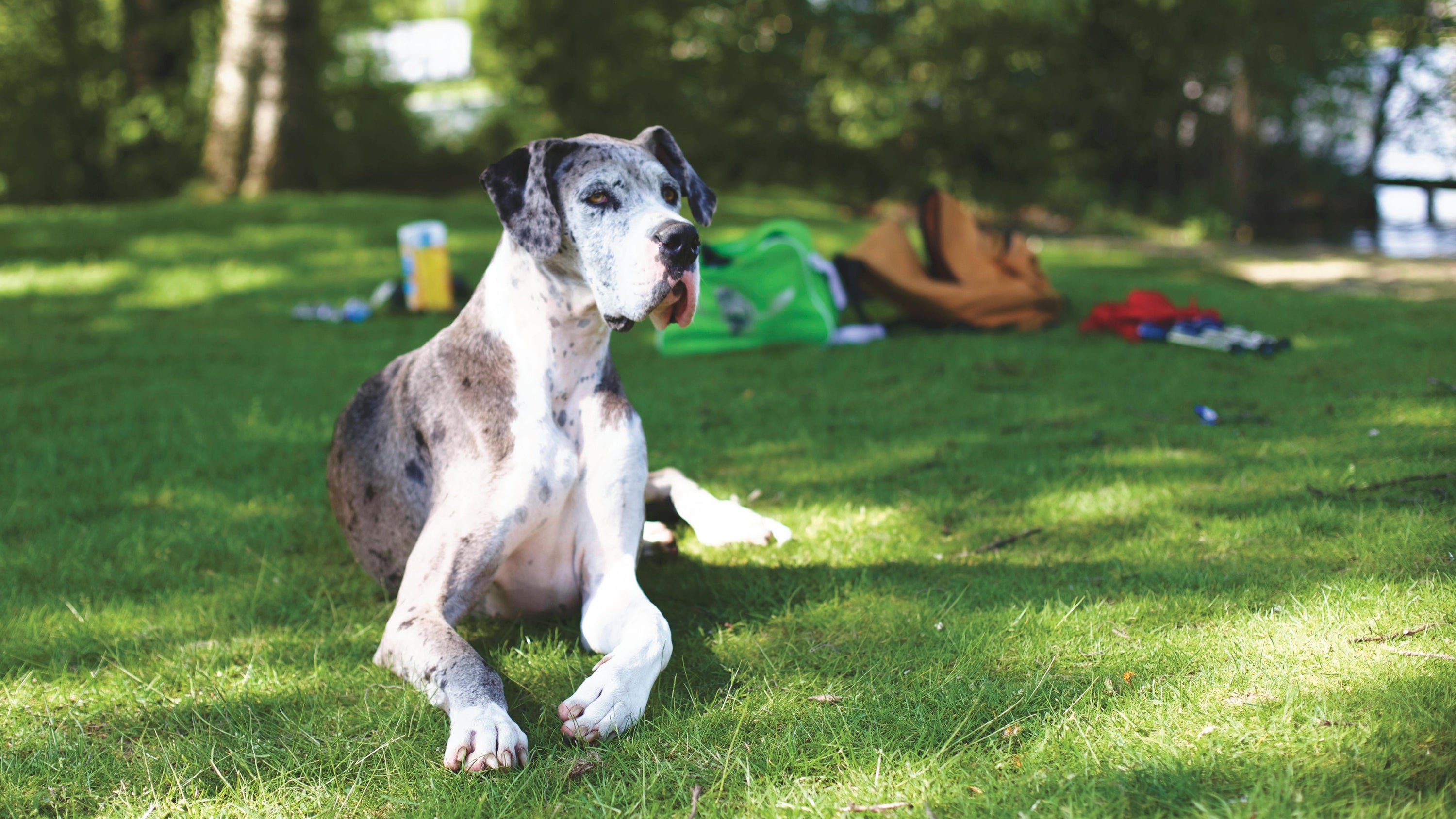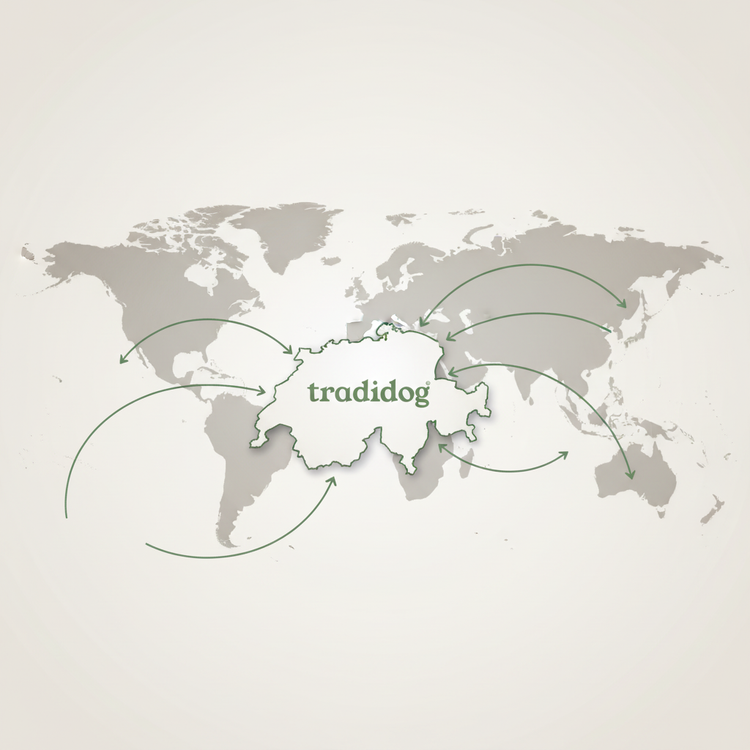
The largest dog breeds
Are you fascinated by large dogs that are impressive just by their appearance? Large dog breeds are not only imposing, but often also gentle giants with a loyal and balanced nature. In this blog entry, we take you into the world of the largest dog breeds and show you what makes these impressive four-legged friends so special. Whether as a loving family dog, loyal protector or striking companion - large dogs attract admiring glances everywhere. Find out here which breeds are among the largest in the world, what makes them so special and what you need to look out for before buying one.
1. Large dog breeds
There are countless large dog breeds. Listed below are those that are more common in Europe and popular with owners.
Great Dane:
The Great Dane is known as the largest dog breed in the world. With its majestic appearance and friendly nature, it is often referred to as a gentle giant. Despite its imposing size, it is a loyal and affectionate family dog that seeks close contact with its owners. Due to its size, it needs a lot of space and regular exercise.

St. Bernard:
The Saint Bernard is a massive, gentle breed that was originally used as a rescue dog in the Swiss Alps. Famous for their good-natured nature and protective instincts, they make perfect family dogs. However, their size requires plenty of space, and their thick coat makes them particularly happy in cooler places.

Mastiffs:
Mastiffs are among the largest and heaviest dogs in the world. These calm and dignified dogs are known as reliable guard dogs, but they are also very loving companions. Due to their size and protective instincts, they require consistent training and enough space to feel comfortable.

Leonbergers:
The Leonberger is a large, friendly breed characterized by its gentle and loyal nature. They make excellent family dogs that get along well with children and other pets. Their thick mane requires regular grooming, and they need plenty of exercise to stay fit and happy.

Newfoundland:
The Newfoundland is a large, powerful dog known for its outstanding swimming skills and rescue instinct in the water. These good-natured giants are particularly gentle and caring, making them great family dogs. Their love of water and thick coats make them ideal for cooler climates and active families.

2. Difference to small dogs
Big dogs are obviously different from small dogs and behave accordingly. The following points should be taken into account:
Weight:
Large dogs often weigh between 40 and 90 kg or more and can reach a shoulder height of over 70 cm. Their imposing size can be impressive, but they also require a lot of space.
Life:
Large dogs can have a short lifespan, often between 7 and 10 years. This is due to the strain on their joints and the faster aging process. Future owners must be aware of this when purchasing, as the loss of a dog is very sad and very stressful for everyone involved.
Health problems:
Large dogs are often more prone to joint problems (e.g. hip dysplasia), heart problems and gastric torsion. Their faster growth can also cause health problems. Health problems require certain actions, i.e. consultation with a doctor. As a future dog owner, you must be aware that such doctor visits are associated with unplanned costs.
Need for exercise:
Large dogs usually have a greater need for exercise. This makes them ideal for active people. Why not run the 10 km route with your dog in the morning? However, be aware that a dog will need this every day and you can't just skip certain days. In other words, your dog needs exercise even at Christmas, New Year and Easter.
Cost:
As with children, size and age determine food intake. The bigger and older they get, the greater the effort required to provide food. Larger dogs incur significantly higher costs for food, medication and accessories (transport boxes, beds, etc.). With the high-quality products in our web shop , these costs can be kept within limits.
Care requirements:
The amount of care required, such as brushing, bathing or cleaning paws, can be more complex for large dogs. Some large breeds also tend to drool. Hair loss is an issue for many dog breeds. If you don't feel like it, take a look at our blog post about dogs that don't shed.
Temperament and behavior:
Large dogs are often calmer and more relaxed once they are out of puppyhood. Many large breeds have a natural protective instinct and are alert.
Suitability for different living circumstances:
Large dogs are better suited to rural or suburban environments where they have plenty of space. They may feel cramped in a city apartment.
Education and training:
Large dogs often require more consistent training due to their strength and size, as bad behavior can be more serious in large dogs.
3. How much do large dogs cost?
Please note that the price of dogs can always vary and we only give you approximate prices or assumptions here. The price also varies greatly depending on where the dog is purchased. We also list cost items that are usually quickly forgotten:
Purchase price of the dog:
- From the breeder: Depending on the breed and breeder, large dogs can cost between 1,000 and 2,500 francs. Especially for popular or rare breeds, prices can be higher, sometimes even over 3,000 francs.
- Animal welfare or shelter: If you adopt a dog from an animal shelter or animal welfare organization, the costs are often lower, between 200 and 1000 francs. Some shelters charge a protection fee to cover the costs of vaccinations, castration and health checks.
Basic equipment:
- Dog bed: 100 to 250 francs for a large and sturdy dog bed.
- Leash, collar or harness: 20 to 100 francs, depending on the quality.
- Food and water bowls: 20 to 50 francs.
- Transport box (if necessary): 100 to 300 francs.
- Toys: 20 to 100 francs, as large dogs need more robust toys.
Feed costs:
- Monthly: Depending on size, activity and quality of food, approximately 100 to 250 francs per month. High-quality food for a large dog can be more expensive, but it is worth it to prevent health problems.
- Annually: This corresponds to approximately 1200 to 3000 francs per year.
Veterinary costs:
- Vaccinations, deworming and regular checks: 200 to 400 francs per year.
- Special treatments or operations: Depending on their health condition, large dogs may require expensive treatments that can easily cost several hundred francs
- Castration/sterilization: 300 to 600 francs, depending on the region and the sex of the dog.
Dog school / training:
- Consistent training is often important for large dogs. A course at a dog school can cost between 100 and 300 francs. Individual lessons with a trainer usually cost between 30 and 100 francs per hour
With additional costs such as grooming, visits to the dog groomer and possible travel costs for holidays, the cost of owning a dog can quickly add up to several thousand francs. Despite all the love for the four-legged friends, it is therefore important to calculate and budget for the costs early on so that you can avoid financial bottlenecks.
Conclusion
So should I buy a large dog, yes or no? Unfortunately, we cannot give you a definitive answer to this question: Perhaps the questions below will help you make your decision:
- Do I have enough space for a dog?
- Am I physically able to lead and control a large dog?
- Can I afford the increased financial expense?
- Do I have enough time and energy to meet the exercise and training needs of a large dog?
- Am I prepared to deal with potential health problems that are more common in large dogs?
Be aware. A larger dog has many advantages and disadvantages. In the end, size doesn't matter. Remember our principle:
No matter whether big or small, treat it well!
Share

